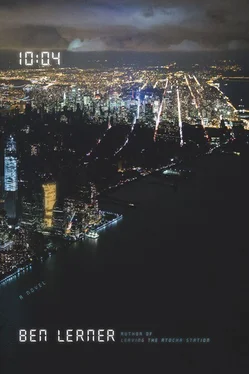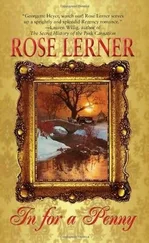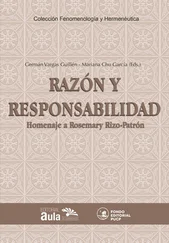“I could write you a letter for it — he could falsify one from me but I could write it.”
“That would be great.” I loved the idea.
“You should really try it.” I thought she meant try to write the novel, but: “You should try to pass off letters you’ve written to an archivist. That’s how you’d know if the fiction was plausible.” I laughed.
“I’m serious. I can put you in touch with the appraiser I worked with when I thought about selling my papers to the Beinecke.”
“I don’t have the courage,” I said. Was she serious? One waiter materialized to refill our wine, another placed my appetizer before me. Puntarella was a green with dandelion-shaped leaves.
“Well, put the stuff about the shuttle in there somehow. I liked that. When you talked about the kids watching the explosion, the nervous laughter — that reminded me of something I hadn’t thought of for a long time, but that I used to think about constantly.”
“These are amazing,” I said, referring to the shrimp, which were. “You’ve got to try a bite,” I said, and she reached across the table with her fork.
“When I was in the first year many centuries ago, our teacher, Mrs. Meacham, lost her daughter.” I guessed first grade was called “first year” in Britain. “Nobody told us, of course. We had a substitute for a few days, were informed that Mrs. Meacham was mildly ill, and then there she was again, maybe a little more distant than usual, but basically unchanged. It must have been a week or two after she’d been back, we were doing recitation exercises, and she called on me to read a passage from the textbook — I remember it as a passage from the Bible, but that seems unlikely. Anyway, she called on me and I read a few lines and then she stopped me. She looked straight at me and she said, her voice frighteningly calm: ‘You look just like my daughter, Mary.’ I remember the name clearly. The class was completely silent, we’d never heard Mrs. Meacham say anything off script. Then she said, slowly: ‘My dead daughter, Mary. You look just like my daughter, who is dead.’ She said it like it was some sort of grammatical demonstration.” The graduate student was trying to listen while still facing the husband, who was talking about a recent trip to India. Our glasses were unobtrusively refilled. “We were all shocked,” she continued. “I remember looking down at my book and feeling tremendous shame, as though I’d been reprimanded. Then I looked up at Mrs. Meacham, who was staring at me, and I heard this terrible laughter.”
“Laughter?”
“ My laughter. I heard it before I recognized it as issuing from my body. It was completely involuntary. It was a profoundly nervous response. For a few seconds only I was laughing, and then everybody started laughing. Everybody in the classroom erupted into loud, hysterical laughter, and Mrs. Meacham, in tears, fled the room. And as soon as she fled the room, the laughter stopped. It stopped all at once, like a disciplined orchestra that has received a sign from the conductor. And we just sat there in silence, ashamed and confused.” She took another bite of my appetizer, which I hadn’t touched while she’d been speaking.
“And then Mrs. Meacham came back into the classroom,” she said when she’d swallowed the food, chasing it with wine, “and resumed her position at the front of the class, and called on me again to read the passage. And I read the passage and the school day continued, and then the school year, as if nothing had happened. I thought of it because you mentioned both the nervous laughter and the jokes, I suppose. Children trying to process a death.”
We drank in silence for a minute and I ate the last shrimp and asked, “Do you have kids?”
“No.”
“Did you want them?” I tried to check in with myself about whether I was mistaking my mild inebriation for an easy sympathy between us.
“At times I have, but most times I haven’t.”
“You never tried?” I’d decided I didn’t care about the sympathy-and-wine calculus.
“I had a surgery to remove a fibroid when I was in my twenties and the scarring made it impossible. That used to happen more in those days.”
“I’m sorry,” I said.
She shrugged. “I think on balance I didn’t want kids anyway. Do you have children?”
“No, but my best friend wants me to help her get pregnant. I mean, we’re thinking of doing IUI. But”—and this was certainly only sayable because of the wine—“my sperm is a little abnormal.” The graduate student involuntarily turned and faced me.
The distinguished female author laughed, not at all unkindly, and asked, “How so?”
“Apparently, every man has a lot of abnormal sperm — sperm that are shaped wrong or something and so aren’t going to fertilize an egg. But I have more abnormal sperm than is normal, so they said it might be harder for me to get someone pregnant.”
“But not impossible.”
“No. But it could take a really long time and my friend is already thirty-six. And they might recommend going straight to IVF, which I don’t think she’d want to do.”
“So you’re off the hook? Do you want to be off the hook?”
“I don’t know. They want me to repeat the test — this one could have been off. And regardless, I think Alex — my friend — is still going to want me to try for a while. Try the IUI thing, I mean.”
“Isn’t this all terribly expensive?”
“Yeah, and Alex is between jobs. But my agent thinks I can get a big advance for a second novel. On the strength of the story. And I teach.”
“Falsifying his archive to subsidize fertility treatments; faking the past to fund the future — I love it. I’m ready to endorse it sight unseen. What else happens?”
There was one other story I knew I would tip in, a story I’d only recently heard from Alex’s stepfather. “I’m not sure how this will fit, exactly, but the protagonist had — will have had — a relationship when he was younger that I think will form an important part of his history and relate to his inclination toward fabrication. He’s in college and falls in love with this woman, Ashley, a couple of years his senior who, about six months after they first get together, comes back from the doctor in tears and tells him she’s been diagnosed with cancer.”
“That young?”
“It happens, right? Say they find it somehow during a routine examination. At first it looks like she’s going to drop out and go live with her family during treatment, but then she decides — in part because she’s in love with him, in part because her relationship with her parents is difficult — to undergo it there, at a hospital not far from campus. This is the first romantic relationship either has ever been in where one partner really has to care for the other, not just try to impress the other; it’s his first serious relationship away from home and it’s developing in the shadow of death. There’s no surgery, but then — worse — there’s radiation and chemo; he drives her to the hospital in her car for each treatment, dropping her off because, for whatever complex of reasons, she doesn’t want him there, asks that he respect the intimacy of her relationship to her oncologist, a woman with whom she feels close. He waits in the parking lot or drives around smoking, listening to music. She loses weight, hair; there is a lot of weeping and courageous resolve; he learns to cook meals rich in bioflavonoids for immune support; he leads conversations about their future in which he insists he wants kids — which he doesn’t — in order to insist on futurity in general. Imagine a year of this,” I said to the distinguished female author. “He’s a boy pretending to be a man losing his partner; he’s making occasional love to an emaciated young woman who might have a terminal condition, while their peers are eating ecstasy and going to parties or whatever; he’s ghostwriting her papers, e-mailing her professors to request extensions, and so on. And then one night, let’s say it’s New Year’s Eve, they’re watching a movie in bed, say it’s Back to the Future , and she says to him:
Читать дальше










